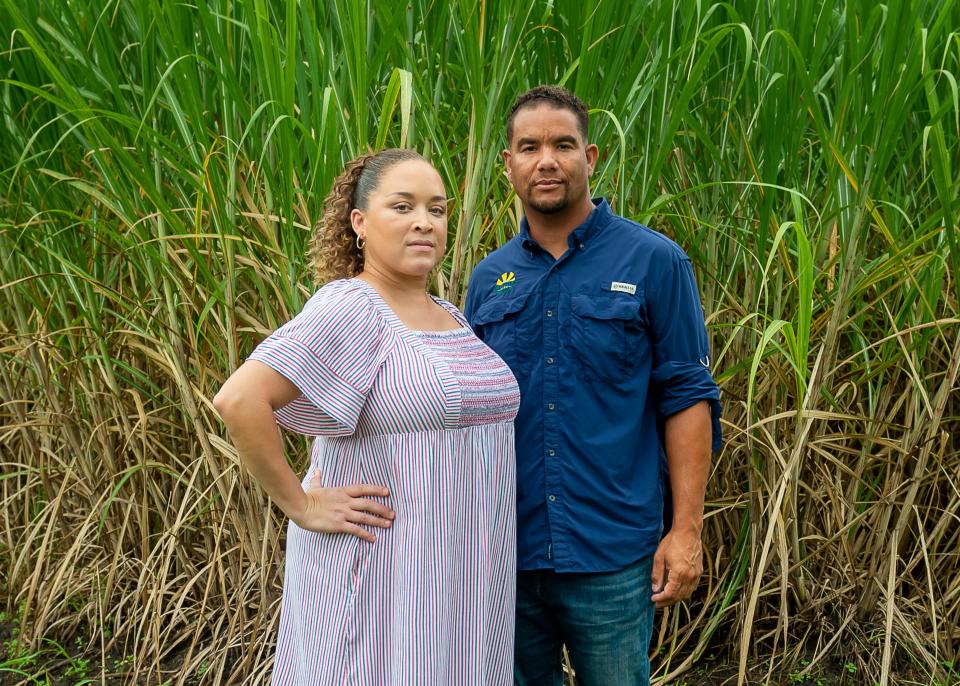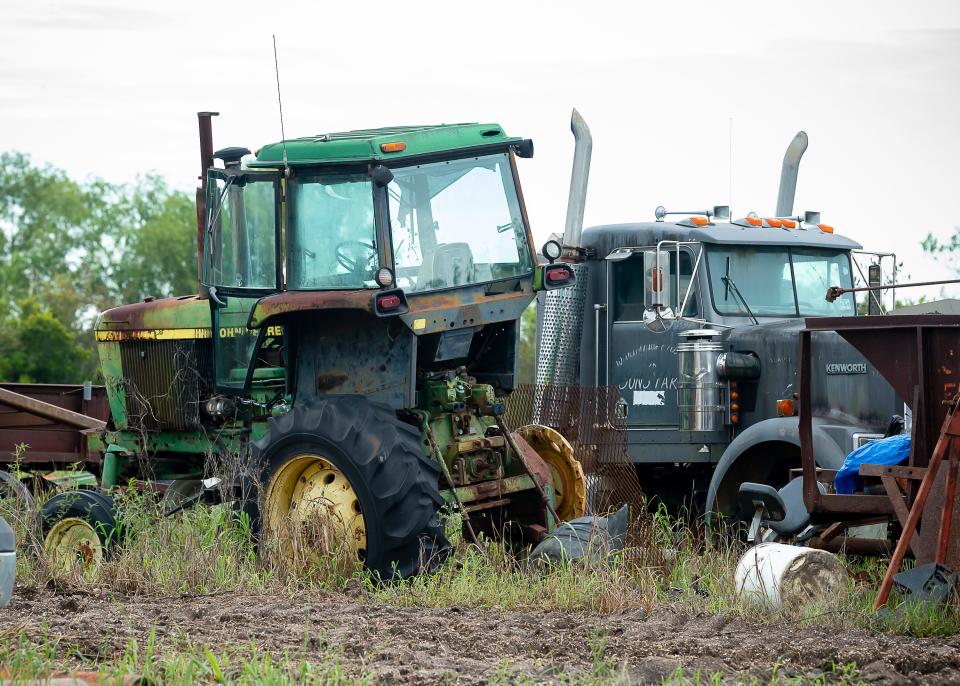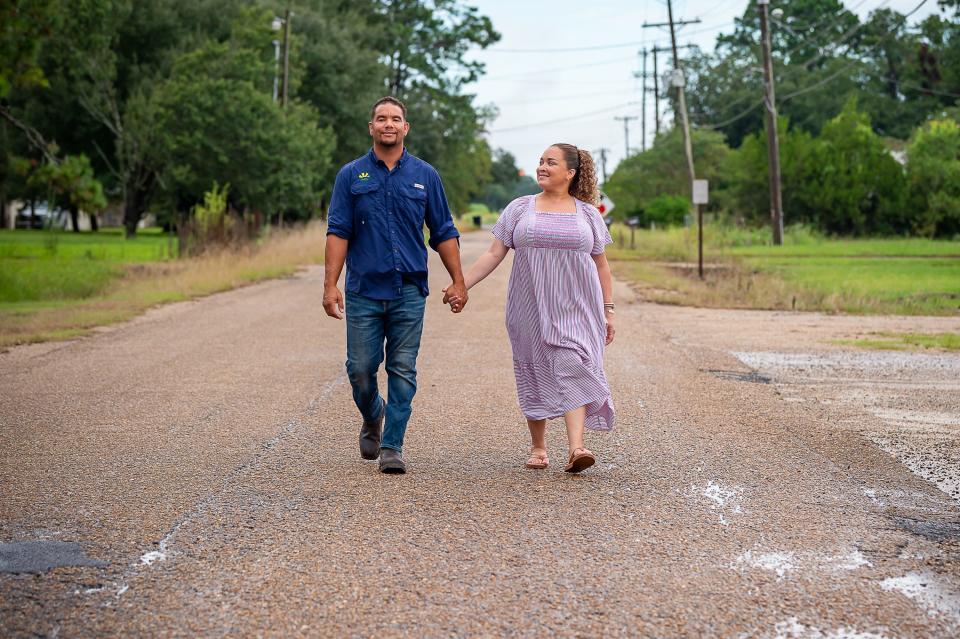5,000 acres to foreclosed: How one family’s story shows the struggle of Black farmers
New Iberia, Louisiana, where sugar cane fields stretch to the bayou, smells like wet earth and flowers in late August.
Fourth-generation sugar cane farmer Wenceslaus “June” Provost Jr., 46, and his wife, Angie Provost, 44, still own a home on what’s left of the 24 acres June’s grandfather bought from a Black landowner in 1964. Both have blood ties to both enslaved people and enslavers.
Their land is now half the size since a chemical company collected on a debt June’s father owed. The Provosts no longer farm cane here. There are some sunflowers and improbably tall okra plants, a riot of yellow blooms and conical pods this time of year. Behind a farm shop, silent farm equipment waits in the mud.
At the height of his success in 2008, June Provost was farming 5,000 acres of sugar cane, mostly on leased land. He’s one of the last remaining Black sugar cane farmers.
“Sugar cane is my life, it’s my enjoyment, it’s my family’s legacy, it’s everything to me,” he said.
He idolized his father, the way he loved planting the cane and watching it grow. Like his dad, June Provost liked the hard work of laying the cane, mounding the dirt around it to protect it from the wind.

“I always say that planting is almost like a sense of hope,” he said. “That’s your future right there.”
But in a decline the Provosts laid at the foot of the Department of Agriculture and years of insufficient and predatory farm loans, most of the land they once leased is now gone, taken over by other farmers.
“They don't make any more new land,” June Provost said. “So that's always in the back of my mind. Although we are fortunate that we have a lot of projects happening, farming is still my No. 1 thing and in reality, I know I will never have back what I had. It's a hard pill to swallow.”
Mounting debt
The Provosts said the USDA’s Farm Service Agency-issued loans were insufficient to cover the full cost of farming. Loan proceeds were often delayed until late in the growing season, which made timely planting nearly impossible and reduced the Provosts' yield.
"It just started a domino effect,” Angie Provost said. “That system of debt peonage, it’s almost inescapable.”
In 2008, June Provost had only just begun farming on his own, to great success. That year, he was awarded the Iberia Parish Farm Bureau Farmer of the Year and had grown his farmland to 5,000 acres of cane.
To make that acreage profitable, he needed his crop loans in February. They sometimes didn’t arrive until mid-June, when most cane is finished and ready for harvest. They fell behind on their loan payments and, soon, their rent.
In 2009, the Provosts were outbid by area farmers on a combined 500 acres of leased land. “They were procuring land from June by going after his landlords and targeting his farm,” Angie Provost said.
By 2014, June Provost was farming fewer than 1,200 acres. He was on the precipice of being forced out of the business.
It was the beginning of a precipitous fall fueled by mounting debt.
The Provosts began to fight back, networking with other Black farmers, getting organizational support, meeting with attorneys and organizing a defense.
“We built a network and were trying our best to rebuild our lives,” Angie Provost said.
But when they began speaking out about the unfair treatment by the USDA and the local agents who served the organization, their trouble began anew.
Intimidation
Angie Provost steeled herself when she recounted the years of intimidation that followed.
The Provosts in 2014 found dead cats lined up next to a tractor on their property, which they took as an ominous sign. Perhaps more ominous were the men who would park in front of the Provosts' house and sit silently, watching, from the safety of their trucks.
“Those are residuals of the past,” Angie Provost said. “You know, they used to do that in the old chain gang system. They used to do that. They used to call them the slave patrols."
It was around that time the Provosts found cinder blocks planted in the sugar cane fields like potatoes, hidden under the cane to break their cane cutter. On another occasion, someone broke into a tractor, smashing the windows and tying a chain across the steering wheel.
On a separate occasion, New Iberia sheriff's office deputies responded to a report of criminal damage to equipment on the Provosts' property. Someone had filled the transmission of a John Deere tractor with mud and put water and glass shards in the hydraulic tank.

The tractor had been cleaned by the time police arrived, and they said they were unable to get clear fingerprint samples. No one was charged. But the people who vandalized these machines knew how they worked, June Provost pointed out.
"I remember on the tractor that they were taking off the injector pump. They put a hole in the diesel tank," he said. "I mean, it's just things to slow you down, slow your operation down, whatever it took."
Just 15 miles from the Provosts’ land, a historic murder points to a history of violence against Black farmers.
Kaia Shivers, who created the Black Farmers Index, is descended from John Fernest Jones, who was brutally killed in nearby St. Martinville.
The family’s oral histories say Jones farmed several hundred acres in the Louisiana lowlands in the 1930s. In a fight for Jones’ acreage, a white farmer tried to shoot Jones. When the gun jammed, Jones struck and killed the man with a hoe in self defense. Jones was ultimately acquitted of his murder.
“When he was found not guilty, holy hell broke out and then they had to sequester him until they could sneak him out of Louisiana,” Shivers said.
Jones hid in Texas but returned to Louisiana in 1949. He didn't make it out alive.
“In less than a week, his body parts were found on the train tracks in St. Martinville,” Shivers said.
No one was charged, but the family says white men were behind the murder. The family left St. Martinville behind. The land was cursed, they said.
Kicked out
The Provosts were driven from their land, too.
At the height of the tension surrounding the Provosts' farmland, as their debt mounted, their local USDA-guaranteed bank First Guaranty seized their home and surrounding property as collateral. In the fall of 2018, the Provosts were served an eviction notice by the sheriff’s office. They moved in with June Provost's mother. They still live there to this day.
June Provost’s face crumples when he recalls that day. It was the weekend of the Sugar Cane Festival, usually a celebratory time.
"I just had a bag, a grocery bag, and I was just trying to empty out the drawers, like where do I even start?” he said. “Our whole life was there. Every plant we planted, every tree we planted. That was our home. That was our safe spot."
Public record shows the Provosts filed a lawsuit that month, accusing the bank of requiring excessive collateral from Black farmers and violating their civil rights under the Fair Housing Act by using their home as collateral for business credit.
Wyman Bankston, the attorney representing the bank, said he was unable to comment on the case or make a statement regarding the Provosts' claims of racist loan policies.
The Provosts watched their home decline and the weeds grow tall as the property sat idle.
More than two years later in the late spring of 2021, the eastern district of Louisiana approved a settlement agreement between the Provosts and First Guaranty Bank, dismissing the case.

"But the battle is still not over," Angie Provost said. "You see, the battle for Black farmers is still ongoing."
They still retain a small sliver of their original land. But June Provost worries the USDA will seize what's left of his farm equipment. The Provosts still owe the government more than a million dollars on past crop loans.
“That's a tractor that my dad used to run, so that means a lot,” he said, pointing to one of the sleeping giants in his wet field. “So the sentimental value is a lot. And if we had to foreclose, they would sell that for pennies on the dollar to white farmers.”
Angie Provost leaned toward her husband and reached for his hand.
“You can hear the distress in his voice,” she said. “It’s so traumatic, and it’s created such a feeling of PTSD for us. We literally still have night terrors.”
Community support
Down the road from their house, the Provosts are creating a gathering space in a farm workshop, where they can honor their farming roots and explore the complicated history of sugar cane.
Inside, a wall near the entrance serves as a gallery featuring images of important Black farmers, the Provosts' efforts to help farmers in Ghana, and June’s father and brothers in the fields, sugar cane growing strong and tall around them.
There’s also a framed picture of June Provost standing in a field with Timothy Pigford, who filed the landmark Pigford v. Glickman class-action lawsuit in 1997 on behalf of hundreds of other Black farmers.
The plaintiffs called the USDA a “racist plantation disguised as a government agency” that had discriminated against Black farmers since the Civil War.
June Provost calls Pigford Uncle Tim. With encyclopedic knowledge of farming, its laws and its complexities, he’s a mentor to the younger farmer.
The two men often talk of their love for farming, which brightens June’s mood.
“When I lost my home, he was definitely one that I talked to who had been in that situation before,” he said. “He helped me greatly to get through that.”
In 1999, the courts approved a settlement in the Pigford case, paving the way for more than $1 billion in cash, tax payments, and debt relief for Black farmers. Among those compensated was the Provost family, who received the $50,000 standard settlement.
“Not even enough to buy a good truck,” June Provost said. “Maybe an old, used truck, some utilities and a few credit card bills. But it didn’t put a dent in our fertilizer bills or our chemical bills.”
Black farmers all received the same amount, no matter the size of their farms.
“That’s the biggest thing I take away from Pigford,” Angie Provost said. “This is good enough for you. You’re all the same.”
Making a difference
As they work to rebuild, the Provosts are leaning into their role as champions of grassroots change.
Without its thousands of acres of sugar cane, Provost Farm now serves as an avenue through which to preserve the ancestral legacies of South Louisiana's Black and Indigenous sugar cane farmers, Angie Provost said.
The Provost's plans include finding more sustainable ways to grow and market sugar cane. They hope to eventually make Agricole rum, distilled by Black distillers from Black farmer-grown sugar cane and distributed by Black-owned businesses.
“The sales of the bottles can go to projects that uplift, fund and pay Black farmers and bring back that population of folks working the land,” Angie Provost said. “It’s also creating pathways that secure again what we own so that we don’t continue on a pathway of losing things unnecessarily.”
The Provosts can begin to plant more cane once the rain clears. But they’re not operating on a level playing field, Angie Provost said, pointing toward some of the neighboring white-owned farms.
Black, brown and poor white farmers are often left with the land no one wants, she said. This land floods without warning. At the bottom of a topographical bowl, it holds runoff from other nearby farms. But it will have to do, she said.
“One thing I want you to notice on this street,” she said. “The homes that are elevated and the homes that are not. You can guess whose homes are not.”

But despite the fact that these low-lying lands are flood-prone, that sometimes a Confederate flag flies from one of their neighbor’s homes, the Provosts are here to stay, even if their holdings have been diminished. They’re committed to farming, and to protecting other Black farmers, a mission for which they were recently awarded Public Justice’s 2022 Illuminating Injustice Award.
“This story of June and me is the story of America,” Angie Provost said. “This is not June and Angie’s story, this is our story, meaning all of us. And I’m going to fight.”
More in this series
Uneven Ground: The exceptional stories of the South’s Black farmers
This article originally appeared on USA TODAY: Black-owned Louisiana farm loses land under weight of USDA loans

